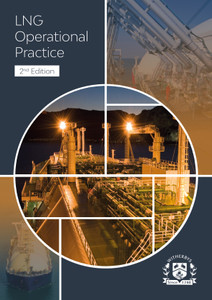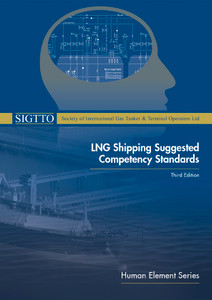
Marine transportation of LNG is the only sector of merchant shipping where steam propulsion systems remain widely employed. This SIGTTO publication sets out competence standards for engineers operating and maintaining these systems and forms default minimum training recommendations for best practice.
This set of standards has been written using the ‘competency based method’ that is widely used in STCW and the industry in general.
Each of the main sections (management and operational) provides a summary of the various competences that must be attained, listing the required knowledge and understanding and the outcomes of effective performance.
The standards are not mandatory, but SIGTTO believes they represent current best practice for operational training standards for engineers. SIGTTO strongly recommends that they should be adopted and also improved and expanded by operators to suit their own ships and operations.
In 2006, SIGTTO published a set of standards for the LNG shipping industry, a move that was welcomed by members. This was followed by a similar set of standards for the LPG shipping industry in 2008.
The marine transportation of LNG is the sole remaining sector of merchant shipping where steam propulsion systems remain widely employed and are still being installed. SIGTTO’s members recognized the importance of establishing agreed competence standards for Engineers operating and maintaining these vessels.
The industry has an enviable reputation for safe and reliable delivery. Responding to the challenges of training and developing Engineers to service the industry is essential if it is to maintain this record.
This set of standards will form the default minimum for best practice. SIGTTO believes that they can and should be built upon by operators, who are encouraged to develop additional appropriate standards for their own operations and ships. SIGTTO also believes that these standards should be improved upon, or adapted where necessary, to provide standards that are truly relevant and usable.
In early 2009, SIGTTO set up a working group to tap into the experience that was held within its membership. The standards that emerged from that exercise have been collated into this book and were formally adopted by the SIGTTO board in Copenhagen on the 26th May 2010. They have been written using the ‘competence based methodology’ that is widely used in STCW and the industry in general.
As a guidance document, this set of standards is not, and cannot be, considered mandatory. However, SIGTTO believes that they represent current best practice for operational training standards for Engineers, and strongly recommends that they should be adopted by those engaged in the operation of this ship type.
Engine Management
Management (1) Familiarisation and Understanding
Management (2) Maintenance and Repair at the Management Level
Management (3) Controlling the Operation of the Ship and Care for Persons Onboard at Management Level
Management (4) Electrical, Electronic and Control Engineering at Management Level
Engine Operational
Operational (1) Familiarisation and Understanding
Operational (2) Electrical, Electronic and Control Engineering at Operational Level
Operational (3) Maintenance and Repair at Operational Level
Operational (4) Control the Operation of the Ship and Care for Persons Onboard at Operational Level
Underpinning Knowledge
Appendix 1 – Reference Documents
The Society of International Gas Tanker and Terminal Operators (SIGTTO) is an international body established for the exchange of technical information and experience, between members of the industry, to enhance the safety and operational reliability of gas tankers and terminals. Learn more: https://www.sigtto.org/about-us/
- Number of Pages:
- 36
- ISBN:
- 9781856094016
- Binding Format:
- Paperback
- Book Height:
- 297 mm
- Book Width:
- 210 mm
- Weight:
- 0.4 kg
- Published Date:
- November 2010
- Preview:
- Yes





